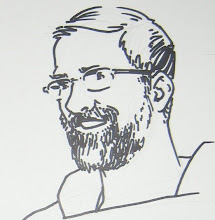 One week into his new presidency, Barack Obama is still one of the most talked-about people on the planet. It's hard to go anywhere - even to websites dedicated to the discussion of comic books! - without bumping into references to the 44th President of the United States. And where once the focus tended to remain on the historic significance of an African American ascending to the highest office in the land, now the talk has turned to the more familiar territory for U.S. presidents: is he doing the right things? It's still much too early to draw any conclusions on that question, but I think we're beginning to at least get a better feel for the man.
One week into his new presidency, Barack Obama is still one of the most talked-about people on the planet. It's hard to go anywhere - even to websites dedicated to the discussion of comic books! - without bumping into references to the 44th President of the United States. And where once the focus tended to remain on the historic significance of an African American ascending to the highest office in the land, now the talk has turned to the more familiar territory for U.S. presidents: is he doing the right things? It's still much too early to draw any conclusions on that question, but I think we're beginning to at least get a better feel for the man.One trend that's become apparent in Obama's actions, so far, is that he's focusing on the future, not the past. His Inauguration speech had several mild jabs at the previous administration, but they were made in passing, and only as a point of contrast for what he hopes to accomplish in the future. Consider this passage from the speech:
"But our time of standing pat, of protecting narrow interests and putting off unpleasant decisions -- that time has surely passed. Starting today, we must pick ourselves up, dust ourselves off, and begin again the work of remaking America."
The lasting images from that small section are not the ones that he begins with - that of lobbyists dictating government policy for a powerless electorate, and infrastructural and environmental concerns being shunted off to the sidelines by those in charge - because he quickly declares that period to be over, and instead paints a more encouraging portrait of the classic indomitable American spirit that built the country in the first place. In this way, he acknowledges the problems that exist currently but couples that with a commitment to address them. That's great leadership.
In another part of the speech, he says:
"The question we ask today is not whether our government is too big or too small, but whether it works -- whether it helps families find jobs at a decent wage, care they can afford, a retirement that is dignified. Where the answer is yes, we intend to move forward. Where the answer is no, programs will end. And those of us who manage the public's dollars will be held to account, to spend wisely, reform bad habits, and do our business in the light of day, because only then can we restore the vital trust between a people and their government."
Perhaps most telling in that quotation is the admission at the end of an existing trust gap between the government and those whom they govern. I think back to my former workplace and wonder, "Would any of our leaders there have been bold enough to own up to that in public?" It seems highly unlikely to me, and yet Obama does so on (literally) Day One.
While still somewhat lacking in specifics - and one would shudder to imagine what an Inauguration speech that was laden with minutiae would sound like! - that previous section of the speech lays out a blueprint for how the Obama administration plans to re-calibrate the American government. There's reflection, in the form of determining, for each existing program, whether it's working or not; there's accountability promised on behalf of those in charge; and there's an implicit commitment to transparency. Toward that final point, one need only visit the new and improved White House blog to appreciate what a new day has dawned in Washington. (Can anyone even imagine the Bush-Cheney administration operating within a similar aura of forthrightness?) Again, these are all indicators of great leadership.
One of the most-cited portions of the speech went as follows:
"To those who cling to power through corruption and deceit and the silencing of dissent, know that you are on the wrong side of history, but that we will extend a hand if you are willing to unclench your fist."
To fully grasp just how different a tone was set by these words, compare them to what George W. Bush said in his infamous "Axis of Evil" address:
"States like these, and their terrorist allies, constitute an axis of evil, arming to threaten the peace of the world. By seeking weapons of mass destruction, these regimes pose a grave and growing danger. They could provide these arms to terrorists, giving them the means to match their hatred. They could attack our allies or attempt to blackmail the United States. In any of these cases, the price of indifference would be catastrophic."
Bush offers no olive branch, but instead exclusively peddles the commodity that would later get him re-elected: fear. He paints the world in the sort of stark black-and-white terms that only a small child would buy into: that of pure-good versus pure-evil. "You're either with us, or you're a terrorist!" That's cowboy leadership.
Obama, on the other hand, acknowledges the threats that are still out there, but also provides hope for eventual peace. History may prove that he was too naive, but I think that we've already seen enough to conclude that Bush was too divisive in his approach. (Which is quite ironic, considering the man characterized himself as "a uniter, not a divider" during the 2000 campaign!) The world has been growing increasingly more dangerous for decades, but vilifying your enemies while keeping your populace cowering in fear can't possibly be the right response. Barack Obama, it appears, understands that there's no eventual outcome from such an approach that can jibe with the ideals so proudly proclaimed in his country's constitution. He has, at the very least, presented his people with a path that is no longer at odds with their espoused values. At the risk of beating a dead horse: that's great leadership.
Reflection, honesty, accountability, transparency and an alignment of actions to values (some might call that "integrity", I suppose)... those are all attributes that have already exhibited themselves in some of President Obama's words and actions in his first week in office. They also show up in many of the books about Agile, as well as in discussions of leadership. I happen to believe that those are all traits that we should commit to, ourselves, and that we should expect from our leaders. Anything less should simply not be acceptable.





No comments:
Post a Comment